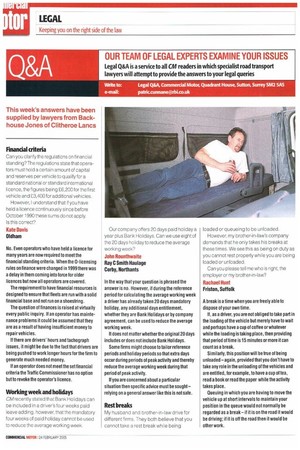OUR TEAM OF LEGAL EXPERTS EXAMINE YOUR ISSUES
Page 38

If you've noticed an error in this article please click here to report it so we can fix it.
Legal Q&A is a service to all CM readers in which specialist road transport lawyers will attempt to provide the answers to your legal queries Wrfte to: Legal Q&A, Commercial Motor, Quadrant House, Sutton, Surrey 5M2 SAS e-mail: patric.cunnane@rbi.co.uk
Financial criteria
Can you Glatt the regulations on financial standing? The regulations state that operators must hold a certain amount of capital and reserves per vehicle to qualify for a standard national or standard international licence, the figures being £6,200 for the first vehicle and E3,400 for additional vehicles.
However, I understand that if you have held a licence continuously since before October 1990 these sums do not apply. Is this correct?
Kate Davis Oldham No. Even operators who have held a licence for many years are now required to meet the financial standing criteria. When the 0-licensing rules on finance were changed in 1999 there was a delay in them coming into force (or older licences but now all operators are covered.
The requirement to have financial resources is designed to ensure that fleets are run with a solid financial base and not run on a shoestring.
The question of finances is raised at virtually every public inquiry. If an operator has maintenance problems it could be assumed that they are as a result of having insufficient money to repair vehicles.
If there are drivers' hours and tachograph issues, it might be due to the fact that drivers are being pushed to work longer hours for the firm to generate much needed money.
If an operator does not meetthe setfinancial criteria the Traffic Commissioner has no option but to revoke the operator's licence.
Working week and holidays
CM recently stated that Bank Holidays can be included in a driver's four weeks paid leave adding, however, that the mandatory four weeks of paid holiday cannot be used to reduce the average working week.
Our company offers 20 days paid holiday a year plus Bank Holidays. Can we use eight of the 20 days holiday to reduce the average working week?
John Rounthwaite Ray C Smith Haulage Corby, Northants In the way that your question is phrased the answer is no. However. if during the reference period for calculating the average working week a driver has already taken 20 days mandatory holiday, any additional days entitlement, whether they are Bank Holidays or by company agreement, can be used to reduce the average working week.
It does not matter whether the original 20 days includes or does not include Bank Holidays.
Some firms might choose to tailor reference periods and holiday periods so that extra days occur during periods of peak activity and thereby reduce the average working week during that period of peak activity.
Um are concerned about a particular situation then specific advice must be sought— relying on a general answer like this is not safe.
Rest breaks
My husband and brother-in-law &lye for different firms. They both believe that you cannot take a rest break while being loaded or queueing to be unloaded.
However, my brother-in-law's company demands that he only takes his breaks at these times. We see this as being on duty as you cannot rest properly while you are being loaded or unloaded.
Can you please tell me who is right, the employer or my brother-in-law?
Raehael Hunt Friston, Suffolk A break is a time when you are freely able to dispose of your own time.
If, as a driver, you are not obliged to take part in the loading of the vehicle but merely have to wait and perhaps have a cup of coffee or whatever while the loading is taking place, then providing that period of time is 15 minutes or more it can count as a break.
Similarly. this position will be true of being unloaded—again, provided that you don't have to take any role in the unloading of the vehicles and are entitled, for example, to have a cup of tea, read a book or read the paper while the activity takes place.
Queuing in which you are having to move the vehicle up at short intervals to maintain your position in the queue would not normally be regarded as a break— if it is on the road it would be driving; if it is off the road then it would be other work.










































































































































































































